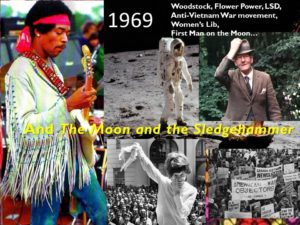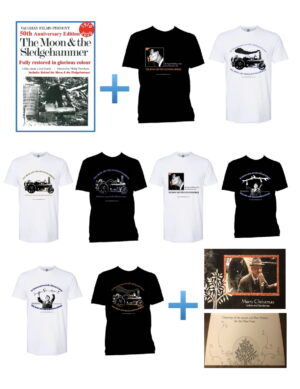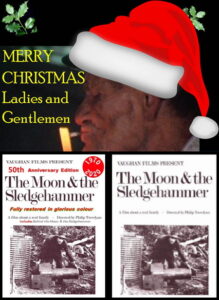Watch online
While this awful virus disrupts life in so many different ways, our cinemas have closed to help prevent further spread – but with people at home in self-isolation, slowly getting bored, cinemas are switching to online streaming to keep people entertained.
You can now stream a selection of Philip Trevelyan’s films from his earliest student film, LAMBING, and watch the progression as Trevelyan honed his art. His message is simple: he admires unsung heroes who have found contentment in life through their highly skilled work. His films give us intimate glimpses into these lives and make us question our values – values that will be challenged today as we face such an uncertain future with new ways of doing things. Guaranteed to take your mind off the virus and focus on the better things in life.
Click on the title to go to the streaming site:
Behind the Moon & the Sledgehammer
The Moon & the Sledgehammer screens at the Berlin Film Festival 2020
We were absolutely thrilled to be invited to the Berlin Film Festival this year for two screenings of The Moon & the Sledgehammer. The Berlin Film Festival is one of the oldest film festivals in existence and along with Cannes and Venice make up the three most important and influential festivals. To be invited to screen at the festival is a very high accolade indeed. The film screened at the very first Berlin Film Festival in 1971 so they, like we, are celebrating their 50th anniversary. Film critic and festival programmer, James Lattimer, introduced the film which he remembered well from his first viewing as a boy. Of all the films from that very first festival, none can claim to be as popular today as The Moon & the Sledgehammer which has proved time and again that its message is timeless.
From the Arsenal Cinema, Berlin. Home of the Berlinale Forum
“The Berlinale Forum is taking place for the 50th time this year and we are celebrating! During the Berlinale and in March, all the films that were shown in 1971 will be screened again. This will provide an insight into an era full of upheavals for society and culture and offer the opportunity to examine the films’ relevance today. When Ulrich and Erika Gregor and their co-founders set up the International Forum of Young Cinema, they had a clear sense of the radical changes in cinema, the sociopolitical situation and the necessity of keeping alive film history. Films from countries not yet on the global radar of cinema premiered here, as did films that experimented with form or others without narratives. From the start, no distinction was made between documentary and fictional films; older and re-discovered films stood side by side with films with a political message. Already known classics made references to utopias and cinematic traditions. A large part of the first Forum program comprised works of artistic innovation and political agitation. Many saw themselves as providing “counter-information” to the mainstream media, for example with regard to the Civil Rights Movement or the protests against the Vietnam War. In films that explored (neo-)colonialism and exploitation in South America and Africa, the camera was a tool of the class struggle.”
THE MOON AND THE SLEDGEHAMMER (Philip Trevelyan, GB 1971, 4.3., Introduction: James Lattimer & 12.3.) There lies another world in the forest behind the high street. This is where the Page family lives. The mischievous father greets the audience right at the start of the film. The viewer observes as he and his adult children go about their daily lives. Everything takes place in the dark house among the trees and the surrounding clearings. The father knows the score and likes to shoot. One son is interested in steam engines, another in mechanics, while the daughters take charge of the garden and the housework. They all speak with the camera from time to time, talking about the future of petrol, family-related frustrations, the problems in England or what the moon looks like through a telescope. The camera wanders often, showing tools, flowers, animals, the light through the trees, drops of oil and blood. The piano outside of the house and the organ inside it provide the music. This gentle idiosyncratic portrait of a family has acquired cult status since its premiere. Today, it has the effect of a time capsule that archived the dialect, ways of life and landscape of southern England – endangered species even then. (jl) Arsenal Cinema, Berlin. March 4th & 12th 2002.
PHILIP TREVELYAN RETROSPECTIVE – POSTPONED
April 2020:
Eden Court, Inverness New date to be announced
Close Up Cinema London New date to be announced
The Slow Film Festival Please check their website for updates: https://slowfilmfestival.com
Click here for more screenings
Due to Covid-19 we are postponing all up-coming screenings and will re-schedule in the future. Please be safe out there!
We are thrilled to announce that a retrospective of the films of Philip Trevelyan will be touring the country this year. It starts in London at the bijoux Close-Up Cinema near Brick Lane, publisher of Vertigo film magazine and holding a remarkable collection of the finest – and often the most obscure -rental films, will host four films: LAMBING
BIG WARE
SHIP HOTEL, and
THE MOON AND THE SLEDGEHAMMER
followed by a Q&A with director Philip Trevelyan.
EDEN GROVE, Scotland’s premier art centre, will be screening the retrospective on 18th April. It will feature the same films and perhaps a few surprises. Philip Trevelyan will host a Q&A following the screenings.
This long overdue retrospective allows his films to be seen as a body of work where his trademark becomes apparent. Trevelyan has documented a slice of Britishness in his films by focusing on unsung heroes who quietly and skillfully go about their business and show us the secrets of a contented life, whether it’s the old shepherd during the bitterly cold lambing season in LAMBING, the patrons of the SHIP HOTEL, the last traditional potter in BIG WARE or indeed Mr Page himself, who all find contentment in different ways. His interaction with his subjects is always intimate, allowing us glimpses into hidden aspects otherwise denied us. His slow pace creates its own tension and depth, producing that mesmerizing quality that we are already familiar with in The Moon & the Sledgehammer.
We are thrilled that Trevelyan’s work as a whole can now be viewed on the big screen, presenting an opportunity to view Trevelyan’s work as a whole
1969 – 2020
HAPPY 50TH BIRTHDAY!
Film celebrates a remarkable 50 years.
Shot in the summer of 1969

1969, such a colourful, eventful, exciting year.
Jimi Hendrix played at Woodstock; John and Yoko were in a bed in Amsterdam for Peace; Everyone knew the lyrics from Hair, protesters were demonstrating against the Vietnam war; Women were burning their bras and demanding equal pay while everywhere eyes were turned skyward as man attempted the first daring moon landing. And that same summer of ’69, somewhere deep in a Sussex woodland clearing, the Page family were going about their business, leaving us with a glimpse into their unusual daily life, their thoughts and ideas, seemingly so very different from our own, eccentric, bizarre even, but yet half a century on this family continues to hold a curiously hypnotizing attraction. Why?
We’re not quite sure when the film will officially be considered 50. It was shot in 1969 but a difficult edit meant it was not released until 1971. Which leaves us with no choice but to enjoy an extended celebration. Join us in the party and enjoy our new features and special offers.
Don’t miss out on an important discussion, highlighting Mr Page’s concerns about the world. Join director Philip Trevelyan and activist Shaun Chamberlin as they look back to Mr Page’s warning and look forward to our uncertain future.
Extinction Rebellion presents
 Doc House, Monday 23rd September 2019 (Equinox) 6.30 PM Q&A with director Philip Trevelyan, joined by activist Shaun Chamberlin Tickets here
Doc House, Monday 23rd September 2019 (Equinox) 6.30 PM Q&A with director Philip Trevelyan, joined by activist Shaun Chamberlin Tickets here
Get your tickets now. Sold out.

 Click here for Christmas Special Offer
Click here for Christmas Special Offer

